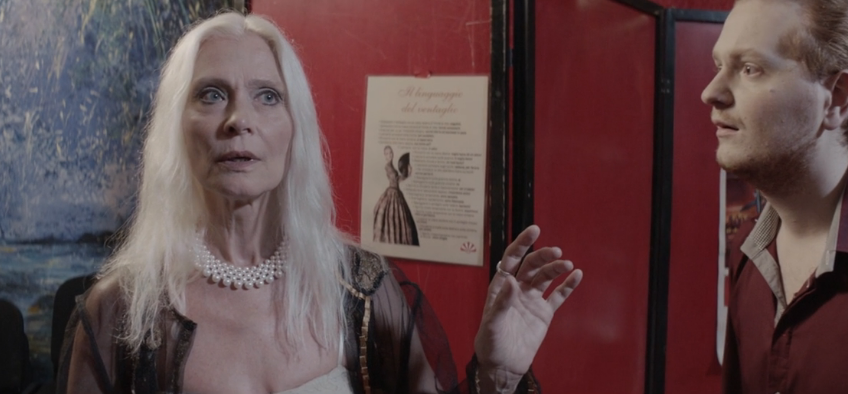
Film Review - “Nil difficile volenti”
(director - Fabio d'Avino)
3.5 out of 5.0 stars
Fabio d’Avino wrote, directed and also acted as a lead actor in his latest short film called Nil Difficile Volenti. I have to admit that the film is very well lit and shooted as concerns the Direction of Photography.
The plot revolves around a theatrical play and the actors involved. I would divide the film in three parts in which I find importance in commenting. At the beginning we have the anticipation of this legend of an actor that is about to play the lead role in the theatrical play. His prompter is a young man who is very anxious about the role that he is assigned and he is also filled with admiration for the actor.
Then, our star arrives in a scene of cinematic exaggeration. Music plays and the Actor is presented through rays of light. The rest of the cast and crew look at him with admiration and eyes almost in tears. I am forced to believe that such an exaggeration has elements of a comic relief. If not, I may lack the tools to examine it.

Cast and Crew reactions while Maestro appears through smoke and light..
After all this anticipation we come to the point where this magnificent actor, portrayed by the truly great actor Franco Nero, begins to rehearse his lines.
Again, classical music plays as we observe Nero perform in slow motion without actually seeing this performance that all the film is supposedly about.
As we understand his performance is implied through cinematic techniques. This choice is always interesting and amusing. It is the same choice that sometimes directors make for example when they want to show a bank robbery, a fight, generally a crescendo.
What we always have to wonder though is if that choice of implication is a conscious stylistic stamp or just covers the weakness of creating a realistic good scene.
At the end, Maestro shares a simple moment of everyday life and it’s difficulties with his prompter and he invites him to the restaurant that he is heading.
Every other actor's performance is extremely exaggerated. With all this tension that is built up I admit that I was sure that the theme of the movie would be this exaggeration per se. What I mean is that the feeling of the film is that everyone is overwhelmed about meeting the Maestro and observe him perform and all that hyperbole would be resolved through a simple moment for Maestro that would have placed him down on earth with all the other mortals.
His character does have moments of this resolution that I seek, for example his illness or his friendly manners with his prompter, but no one else nor the rest of the script seem to follow this path of redemption from the hyperbole.
On the other hand, the aforementioned “exaggeration” can be considered as an interesting stylistic feature that the director chooses to employ, in order to “colour” the cast’s performances with a synthesis between a theatrical stylized behaviour and discharging doses of realistic elements (representations), achieving a “pretentious” yet pleasantly functional story foreshadowing; thus triggering the viewer’s expectations for the “drama” to unfold.

Although scenes do not run too long, maintaining a rather enjoyable pacing throughout the film, at some dialogue scenes, cuts happen too often resulting in a jumpy, unbalanced feeling for the spectator.
Editing was a bit “hasty” at times not allowing the necessary space for the actors’ counterpointing of visual and oral impressions to properly evolve resulting in a disturbance on the act and acted-upon convention.
“Great editing goes unnoticed” they say, but for this to occur the audience's imagination needs time in order to follow narrative subtexts.
Also the use of fades are always a risky alternative to promote narration, since there is a high chance of taking the audience out of the mood the film tries to build. Especially in the case of well-structured stories as the one at hand.
Despite its weak spots, Nil Difficile Volenti is an enjoyable film to watch.
E.Vlachou, MA
Film Critic
K.Kotsinis, MA
Festival Director



